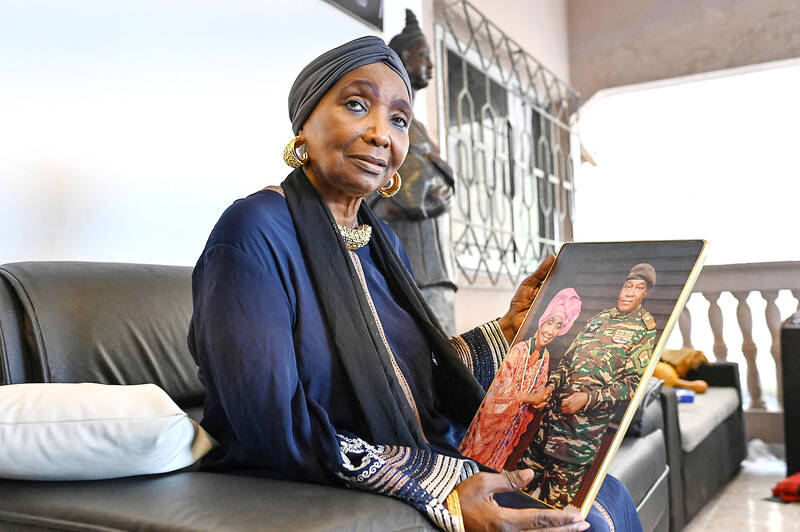Popular Ivorian artist Aicha Kone, who filled venues singing about political freedom for Africa 30 years ago, now wins fans singing the praises of West African junta chiefs.
The 67-year-old has more than half a million followers on TikTok, where she released her latest song on Aug. 26, applauding the military regimes of Mali, Burkina Faso and Niger.
The track lauds the leaders who formed a defense pact, the Alliance of Sahel States (AES), after seizing power in coups between 2020 and last year.

Photo: AFP
“AES, the march towards freedom! AES, you are right!” go the song’s lyrics set to a catchy melody and featuring a photo montage of their leaders.
“I want my oil, I want my diamond, I want my gold,” she sings.
In another 2022 song dedicated to the Malian leader, the Ivorian diva, who fans affectionately call Mama Africa, pays tribute to the Malian Armed Forces, or the Fama.
“Fama, strength to you!” she sings in a smooth, joyful tone.
The juntas in the three insurgency-hit Sahel states have turned their backs on former colonial power France and sought support from Russia instead to battle jihadist violence.
They also have stormy relations with some of their neighbors, including Ivory Coast, who are deemed to be too close to Paris.
In her song for Mali’s interim leader Colonel Assimi Goita, Kone celebrates Russian President Vladimir Putin.
’MAJESTIC DIVA’
Her career began in the 1970s with an appearance on Ivorian state television RTI, during which then-star presenter Georges Tai Benson was struck by her “pure, limpid” voice and clear “enunciation.”
Rising from backup singer to soloist, Kone moved in the same circles as some of Africa’s greatest artists at the time.
In her heyday, she rubbed shoulders with the likes of South African legend Miriam Makeba — her “role model” — Cameroon’s Manu Dibango, Congolese singer Tabu Ley Rochereau and Senegalese musicians Youssou N’Dour and Ismael Lo.
Kone is “a musical personality who does not go unnoticed”, her renowned arranger Boncana Maiga said, adding her impact had been felt “across the continent.”
Her music draws on that of the Mandinka people, a West African ethnic group.
Kone mainly sings in the Dioula language but has replaced traditional instruments with the guitar, piano and brass. “She deserves to be a diva!” said TV host Benson. “When she’s on stage, she’s majestic.”
CLOSE TIES
The walls of Kone’s Abidjan home exhibit her long-standing ties with heads of state — friendships that predate the wave of recent military coups.
Framed photos show the diva posing with former Ivorian presidents Felix Houphouet-Boigny and Henri Konan Bedie — both of whom she says supported her financially — as well as Laurent Gbagbo.
But Kone has since traded the suits and ties of politicians for the uniforms of military officers.
Niger leader General Abdourahamane Tiani last month met the artist in Niamey after she played several concerts in the capital. A video she shared of Burkina Faso’s 36-year-old President Ibrahim Traore — whom she calls her “son” — greeting her with a kiss on the cheek hit a million views.
“They were all happy to meet with me, I gave them my support,” the singer said in an interview.
“We all want to be independent,” she said, commending the leaders of the former French colonies.
“These are young boys who have had the courage to stand up and say loud and clear that they want to take their destiny into their own hands.”
“And I say bravo,” she added.
SINGING FOR PEACE
Since coming to power, the Nigerien, Burkinabe and Malian governments have made a priority of retaking control of their countries from separatists and jihadist forces.
Other Ivorian artists such as reggae star Tiken Jah Fakoly, who is vocal about anti-colonial, pan-African causes, has shown support for the AES, too, but recently also condemned a crackdown on dissent.
Dozens of Burkinabe political dissidents, journalists, judges and human rights activists have disappeared, been detained or enrolled by force into the army to fight jihadist groups.
Meanwhile in Mali, the UN, Human Rights Watch and Amnesty International have accused the army of abuses against civilians.
But in Abidjan, Kone says her leitmotiv has never wavered.
“I have always sung for peace,” she said.

President William Lai (賴清德) has championed Taiwan as an “AI Island” — an artificial intelligence (AI) hub powering the global tech economy. But without major shifts in talent, funding and strategic direction, this vision risks becoming a static fortress: indispensable, yet immobile and vulnerable. It’s time to reframe Taiwan’s ambition. Time to move from a resource-rich AI island to an AI Armada. Why change metaphors? Because choosing the right metaphor shapes both understanding and strategy. The “AI Island” frames our national ambition as a static fortress that, while valuable, is still vulnerable and reactive. Shifting our metaphor to an “AI Armada”

When Taiwan was battered by storms this summer, the only crumb of comfort I could take was knowing that some advice I’d drafted several weeks earlier had been correct. Regarding the Southern Cross-Island Highway (南橫公路), a spectacular high-elevation route connecting Taiwan’s southwest with the country’s southeast, I’d written: “The precarious existence of this road cannot be overstated; those hoping to drive or ride all the way across should have a backup plan.” As this article was going to press, the middle section of the highway, between Meishankou (梅山口) in Kaohsiung and Siangyang (向陽) in Taitung County, was still closed to outsiders

The older you get, and the more obsessed with your health, the more it feels as if life comes down to numbers: how many more years you can expect; your lean body mass; your percentage of visceral fat; how dense your bones are; how many kilos you can squat; how long you can deadhang; how often you still do it; your levels of LDL and HDL cholesterol; your resting heart rate; your overnight blood oxygen level; how quickly you can run; how many steps you do in a day; how many hours you sleep; how fast you are shrinking; how

“‘Medicine and civilization’ were two of the main themes that the Japanese colonial government repeatedly used to persuade Taiwanese to accept colonization,” wrote academic Liu Shi-yung (劉士永) in a chapter on public health under the Japanese. The new government led by Goto Shimpei viewed Taiwan and the Taiwanese as unsanitary, sources of infection and disease, in need of a civilized hand. Taiwan’s location in the tropics was emphasized, making it an exotic site distant from Japan, requiring the introduction of modern ideas of governance and disease control. The Japanese made great progress in battling disease. Malaria was reduced. Dengue was